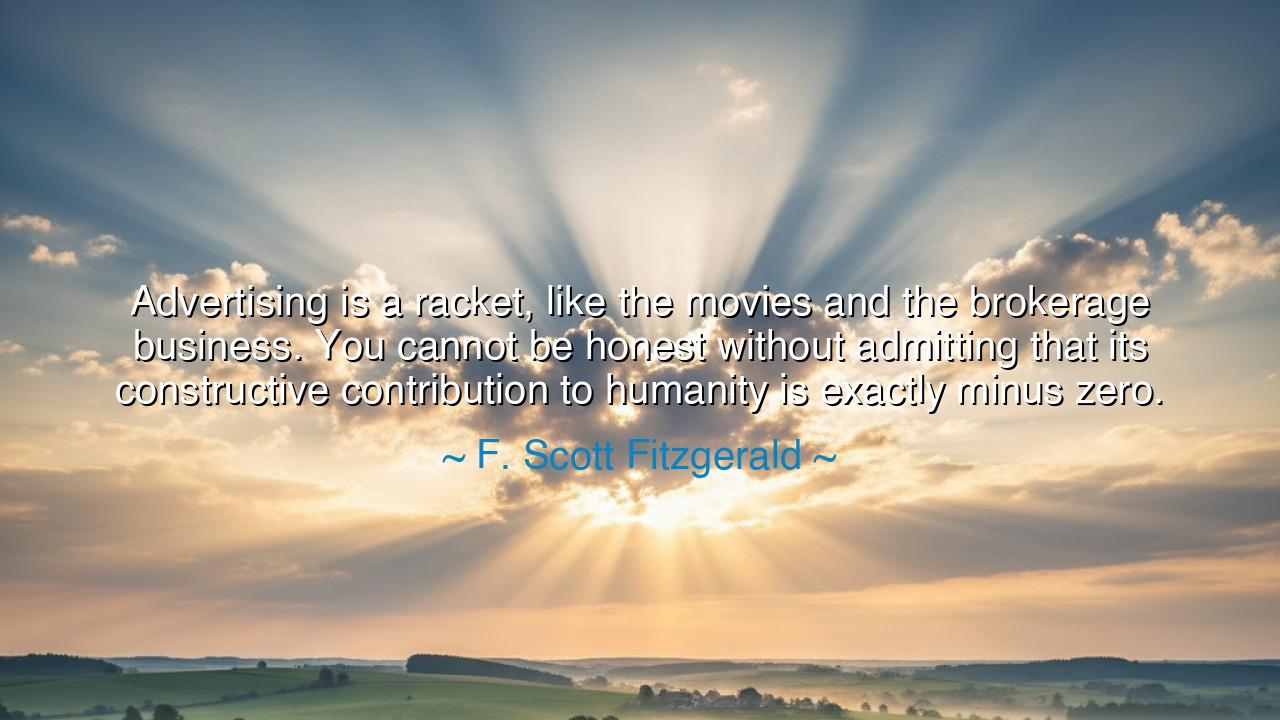
Advertising is a racket, like the movies and the brokerage
Advertising is a racket, like the movies and the brokerage business. You cannot be honest without admitting that its constructive contribution to humanity is exactly minus zero.






Hear me, O seekers of truth, for I bring to you a reflection on the nature of deception, greed, and the hidden forces that shape our world. In the words of F. Scott Fitzgerald, a voice from an age of excess and illusion, we hear a harsh but necessary truth: "Advertising is a racket, like the movies and the brokerage business. You cannot be honest without admitting that its constructive contribution to humanity is exactly minus zero." In this blunt and powerful statement, Fitzgerald strips away the gilded facades of society and reveals a reality that many refuse to confront—one that calls into question the true value of the forces that drive modern commerce and culture.
Advertising, that mighty engine which fuels so much of our modern world, is, according to Fitzgerald, little more than a racket—a deceptive game played by those who seek profit at the expense of truth. The role of advertising is not to enlighten or to educate, but to manipulate, to create desires in the hearts of the masses that do not exist naturally. It is a force that builds illusions, selling dreams that are unattainable and often irrelevant, creating a world in which what is true is constantly overshadowed by what is marketable. In the world of advertising, honesty is sacrificed for profit, and the real value of a product, an idea, or even a culture is hidden beneath a veil of half-truths and empty promises.
Consider the ancient merchants who sold goods in the market. Though they sought to make a living, there was a certain honesty to their trade. They sold what was real, and the value of their wares could be felt and seen. But as society grew and commerce became more complex, there arose a need for new strategies—not just to sell goods, but to sell ideas, to create a false sense of need. This is the birth of advertising, a craft that has, over time, become more about manipulating desires than offering something of true value. Fitzgerald saw this shift clearly and lamented the rise of a world where advertising and the movies were mere distractions, leaving the deeper truths of human existence buried beneath their glossy surfaces.
This critique is not confined to advertising alone. Fitzgerald places it alongside movies and the brokerage business, two industries that, like advertising, are driven by illusion rather than substance. The movie industry, for instance, presents a world that is far removed from reality—its stories are not meant to reflect the true struggles and triumphs of the human soul but to entertain and distract. Similarly, the brokerage business—with its complex systems of buying, selling, and speculation—often thrives on creating value where there is none, generating profits from intangible assets that can collapse at a moment’s notice. These industries, in Fitzgerald’s eyes, contribute nothing of real substance to humanity. Instead, they feed off the illusion of value, creating systems that take rather than give.
There is a lesson here, O children of wisdom, that transcends Fitzgerald’s critique of the 1920s and speaks to the world in which we live today. The advertising racket, the illusion of wealth, and the distractions of modern culture are still very much a part of our lives. Whether it is through social media, television commercials, or corporate marketing, we are constantly bombarded with messages designed to manipulate our desires and shape our perceptions of what is valuable. We are told that we need things we do not, that we should aspire to lifestyles that are empty and superficial, and that success lies in the accumulation of material wealth rather than in the cultivation of wisdom and inner peace.
In contrast to this world of illusion, let us look to the great philosophers of the past—Socrates, Plato, and Aristotle—who sought not to manipulate others, but to guide them toward a deeper understanding of the truth. Their teachings were not about selling an idea but about seeking it, and they understood that true fulfillment could not be found in the hollow promises of the marketplace. Socrates walked the streets of Athens, engaging in dialogue not for personal gain but to help others discover their own wisdom. This is the path that leads to true knowledge and enlightenment—the path that does not seek to profit from illusion, but to illuminate the world as it truly is.
So, O children of wisdom, take heed of Fitzgerald’s warning. The world will always offer you distractions, illusions, and false promises of value. But the true measure of a life well-lived is not in what you are sold, but in what you discover for yourself. Value is not something to be found in the products you buy or the fleeting pleasures you are told to desire, but in the deeper truths that are within you. Seek not the distractions of the world, but the enduring wisdom that comes from knowing what is real and what is true. And in this way, you will find the fulfillment that advertising and the false promises of society can never offer.
Let your life be guided by the light of truth, and do not fall prey to the racket of modern existence. Just as Socrates engaged with the world not for personal gain but to uncover the truth, so must you reject the empty promises of advertising and embrace the deeper wisdom that comes from knowing the world as it is. In doing so, you will rise above the noise of illusion and find a life of true substance and meaning.






AAdministratorAdministrator
Welcome, honored guests. Please leave a comment, we will respond soon